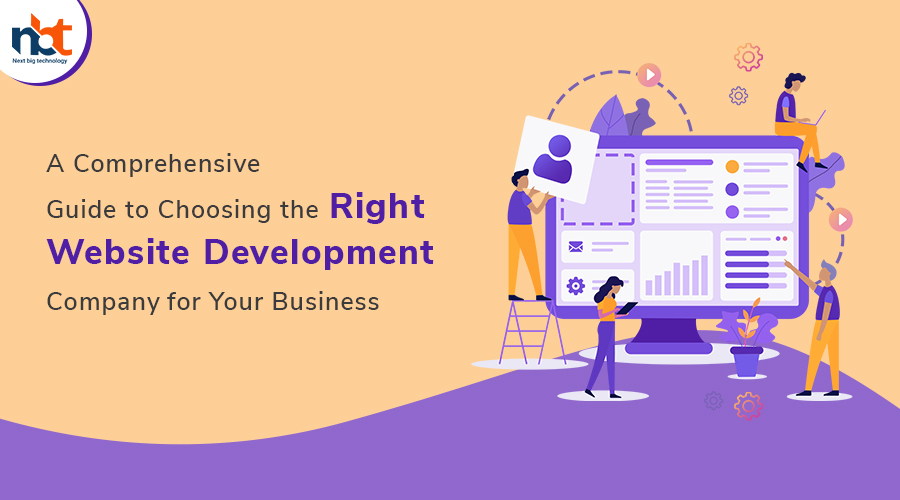Introduction:
In today’s digital landscape, having a strong online presence is crucial for businesses to succeed. A well-designed and functional website is the cornerstone of establishing that presence. However, not all businesses have the expertise or resources to develop a website in-house. This is where a website development company comes in. Hiring a professional web development company can save you time, effort, and ensure that you have a website that meets your business goals. In this comprehensive guide, we will walk you through the process of choosing the right website development company for your business. From understanding your needs to evaluating potential partners, we will cover everything you need to know. Let’s get started!
Table of Contents:
- The Importance of a Professional Website Development Company
a. Why Hire a Website Development Company?
b. Benefits of Hiring a Professional Web Development Company - Defining Your Goals and Requirements
a. Assessing Your Business Needs
b. Defining Your Website Objectives
c. Identifying Your Target Audience
d. Outlining Specific Features and Functionality - Researching and Shortlisting Potential Website Development Companies
a. Gathering Recommendations and Referrals
b. Online Search and Review Platforms
c. Evaluating Company Portfolios and Case Studies
d. Assessing Industry Experience and Expertise
e. Reviewing Client Testimonials and Feedback - Evaluating the Company’s Expertise and Services
a. Website Design and Development
b. Mobile Responsiveness and Optimization
c. Content Management Systems (CMS)
d. E-commerce Capabilities
e. Search Engine Optimization (SEO)
f. User Experience (UX) and User Interface (UI) Design
g. Technical Support and Maintenance - Understanding the Development Process
a. Project Discovery and Requirements Gathering
b. Wireframing and Prototyping
c. Design and Development
d. Testing and Quality Assurance
e. Launch and Deployment
f. Post-Launch Support and Maintenance - Assessing the Company’s Communication and Collaboration Process
a. Availability and Responsiveness
b. Communication Channels and Tools
c. Project Management Approach d. Collaboration and Iterative Development - Considering Budget and Cost Factors
a. Pricing Models (Fixed Price vs. Hourly Rates)
b. Cost Estimation and Transparency
c. Return on Investment (ROI) - Ensuring Compatibility and Scalability
a. Compatibility with Your Existing Systems
b. Scalability and Future Growth - Analyzing the Company’s Support and Maintenance Services
a. Post-Launch Support and Bug Fixes
b. Website Updates and Enhancements
c. Security and Data Backup
d. Service Level Agreements (SLAs) - Reviewing Contracts and Legal Considerations
a. Intellectual Property Rights
b. Confidentiality and Non-Disclosure Agreements (NDAs)
c. Service Agreements and Contract Terms - Checking for References and Conducting Background Checks
a. Contacting References and Previous Clients
b. Verifying Company Credentials and Certifications
c. Checking for Red Flags or Negative Reviews - Making the Final Decision and Commencing the Project
a. Shortlisting the Top Candidates
b. Requesting Detailed Proposals and Quotes
c. Conducting Interviews and Final Assessments
d. Negotiating Contract Terms and Deliverables
e. Making the Final Selection and Kickstarting the Project - Collaborating and Communicating with the Development Team
a. Establishing Clear Project Objectives and Milestones
b. Regular Progress Updates and Meetings
c. Providing Timely Feedback and Clarifications - Monitoring and Evaluating the Development Process
a. Tracking Project Progress and Deadlines
b. Conducting Quality Assurance and User Testing
c. Providing Feedback and Addressing Issues - Launching and Maintaining Your Website
a. Pre-Launch Checklist and Testing
b. Website Deployment and Go-Live
c. Post-Launch Monitoring and Analytics
d. Ongoing Maintenance and Updates
Conclusion:
Choosing the right website development company is a critical decision that can significantly impact your online success. By following the steps outlined in this comprehensive guide, you’ll be equipped with the knowledge and understanding necessary to make an informed choice. Remember to align your business goals and requirements, thoroughly evaluate potential partners, consider their expertise and services, assess communication and collaboration processes, analyze costs and support services, and conduct background checks. By selecting the right website development company, you’ll be on your way to achieving a powerful and effective online presence that drives business growth.









